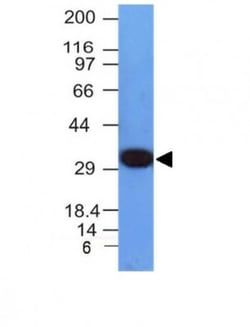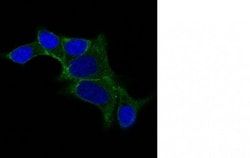PCNA Antibody (PCNA/694), Novus Biologicals™
Manufacturer: Fischer Scientific
The price for this product is unavailable. Please request a quote
Antigen
PCNA
Classification
Monoclonal
Concentration
0.2mg/mL
Dilution
Western Blot 0.5 - 1.0 ug/ml, Flow Cytometry 0.5 - 1 ug/million cells in 0.1 ml, Immunohistochemistry-Paraffin 0.25 - 0.5 ug/ml, Immunofluorescence 0.5 - 1.0 ug/ml
Gene Accession No.
P12004
Gene Symbols
PCNA
Immunogen
Recombinant full length human PCNA protein
Purification Method
Protein A or G purified
Regulatory Status
RUO
Primary or Secondary
Primary
Test Specificity
Recognizes a non-histone protein of 36kDa, which is identified as proliferating cell nuclear antigen (PCNA). It is also known as cyclin or polymerase delta auxiliary protein. Elevated expression of PCNA/cyclin has been shown in the nucleus during late G1 phase immediately before the onset of DNA synthesis, becoming maximal during S-phase and declining during G2 and M phases. This MAb is excellent for multiple applications.
Content And Storage
Store at 4C.
Isotype
IgG2a κ
Applications
Western Blot, Flow Cytometry, Immunohistochemistry (Paraffin), Immunofluorescence
Clone
PCNA/694
Conjugate
Unconjugated
Formulation
10mM PBS and 0.05% BSA with 0.05% Sodium Azide
Gene Alias
cyclin, DNA polymerase delta auxiliary protein, MGC8367, proliferating cell nuclear antigen
Host Species
Mouse
Molecular Weight of Antigen
36 kDa
Quantity
0.2 mg
Research Discipline
Autophagy, Base Excision Repair, Cell Cycle and Replication, Cellular Markers, Core ESC Like Genes, DNA Polymerases, DNA Repair, Stem Cell Markers
Gene ID (Entrez)
5111
Target Species
Human
Form
Purified
Description
- Ensure accurate, reproducible results in Western Blot, Flow Cytometry, Immunohistochemistry (Paraffin), Immunofluorescence PCNA Monoclonal specifically detects PCNA in Human samples
- It is validated for Western Blot, Flow Cytometry, Immunohistochemistry, Immunocytochemistry/Immunofluorescence, Immunohistochemistry-Paraffin, Immunofluorescence.


